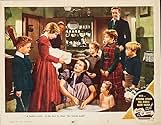This was produced as a sincere attempt to tell the story of the relationship between composer Robert Schumann, his wife Clara, and an up-and-coming youngster, Johannes Brahms.
The story is largely a fictionalized version of the true tale. According to their letters, Clara's feelings for the young Brahms were more of a motherly than a romantic nature. Brahms did indeed feel a great deal for Clara, but he knew the parameters of their relationship and accepted them. The portrayal of Robert in this film is the worst written and least accurate, probably accounting for Henreid's pallid performance. Brahms was only one of the young male talents that Robert befriended and aided, while Clara looked the other way. We now know too that Robert's illness and cause of death was most likely the ravages of syphilis. The picture skirts the issue and never really makes clear what is wrong with him.
The portrayal of the resourceful and strong-willed Clara is more accurate, and Hepburn is a good casting choice, though on the surface an unlikely one, and the best part of the picture is the portrayal of the boisterous Schumann household, which she essentially heads, leaving her husband free to pursue his own interests and talents. And after Robert's death, the real Clara did indeed devote her life to preserving his legacy.
This film is not a bad one, though the reverential way these three people are treated, and the stilted dialogue written for them, gets in the way. Walker looks so much like the portraits of the young Brahms, especially Brahms in his thirties, that it's uncanny.
The choice of Artur Rubenstein to play all of the solo piano pieces on the soundtrack is a puzzling one, as he makes little attempt to differentiate between the styles of playing of the different characters. And Rubenstein was never a particularly strong player of Brahms and Schumann. His playing of Liszt is much better.






































